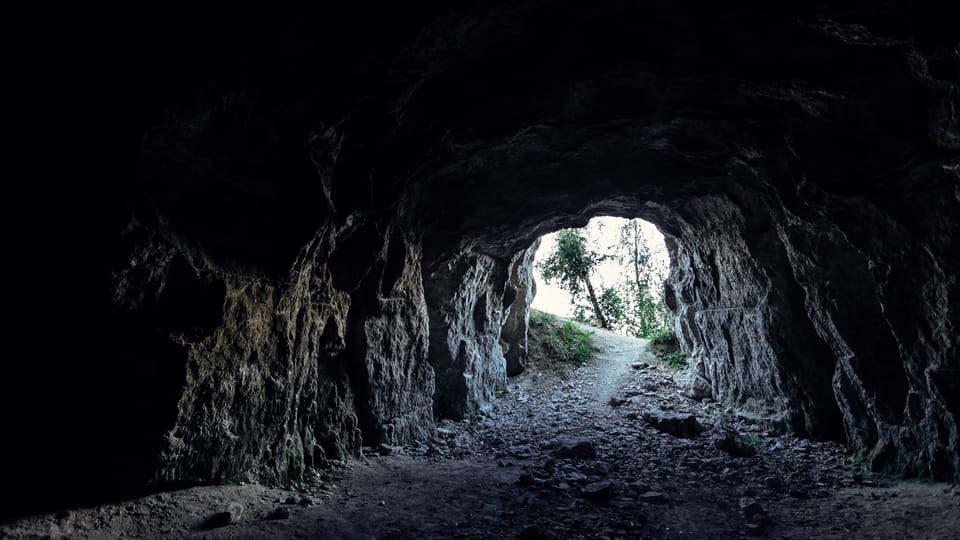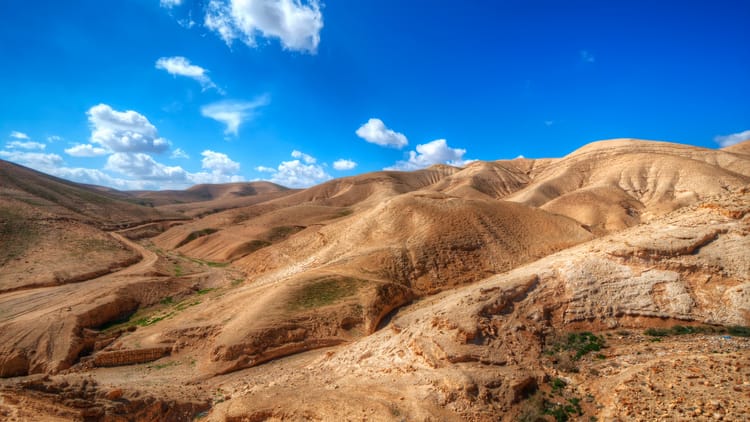How to Handle Overwhelming Trials (Psalm 46)

Big Idea: When facing overwhelming trials, find your security in God, focus on your eternal home, and look to Jesus, not your problems.
In your life, you will face two kinds of crises.
One category is the kind of crisis you can manage on your own. It won’t necessarily be easy, but you’ll figure it out. Mortgage rates go up; you can trim your expenses and cover the increase. You get laid off; you can pivot and get a new job. Your marriage hits a rough spot; you get some help and work to improve it. There is a kind of crisis you can manage. It will be hard, but you can do it.
But there’s another kind of crisis. This is the category of a crisis you can’t handle no matter how hard you try. I hesitate to even list the kinds of things that can happen that are far beyond our capacity to handle. Some situations are so overwhelming that no amount of strategy is enough to meet the challenge. Certain diagnoses, certain losses, certain calamities are so great that it feels like life has become unmanageable.
And that’s the kind of crisis that Psalm 46 wants to address.
A Psalm for Overwhelming Trials
What’s the situation behind Psalm 46?
We don’t know for sure, but scholars have a couple of guesses. Both of them have one thing in common: they’re overwhelming trials for which no human solution exists.
First: In 2 Chronicles 20, a vast coalition of enemies banded together to attack Judah. The king at that time prayed, “We are powerless against this great horde that is coming against us” (2 Chronicles 20:12). No amount of strategy would solve the problem. No great speech would be enough to motivate the troops. They simply didn’t have the military power to respond to this threat. They faced a crisis they couldn’t solve. It was simply beyond them.
Second: Others scholars guess that it might have been a situation described in 2 Kings 18-19. Sennacherib, the king of Assyria, was one of the most powerful kings of his day. The Assyrians were a brutal and barbaric nation, feared by many. Sennacherib came and attacked Jerusalem with an army of 185,000 soldiers. Sennacherib had already crushed many neighboring regions, including the northern kingdom of Israel and several fortified cities of Judah, so Hezekiah faced overwhelming odds. Hezekiah faced psychological warfare and overwhelming military might they simply couldn’t match.
We don’t know for sure if the background of this psalm is one of these two stories. It may have been neither of these. But we do know that this psalm is about an overwhelming trial for which there was no human solution. Verse 2 describes un-creation, when it looks like creation itself is in the process of coming apart:
Therefore we will not fear though the earth gives way,
though the mountains be moved into the heart of the sea,
though its waters roar and foam,
though the mountains tremble at its swelling.
(Psalm 46:2-3)
The Bible teaches that the Lord created the earth in such a way that humans can flourish. In Genesis 1:2, the earth is described as formless and void — without structure and devoid of life. The rest of Genesis 1 describes God turning this formless and void creation into a place where humanity can flourish.
Psalm 46:2-3 is the opposite of that. Verses 2 and 3 are about the world falling apart. Creation itself is coming apart at the scenes. Death and chaos are everywhere. This is not a solvable problem. The very foundations of the earth have been shaken, and chaos has come again. Everything is falling apart.
Here’s my theory. You’re going to face many challenging crises you can face on your own. It will be hard, but you can muscle your way through them. But you are going to face a few situations that will overwhelm you, and it will feel like your world is falling apart.
What do you do when you face a problem so big that there is no human solution, a trial so severe that it feels like the earth is falling apart?
How to Handle an Overwhelming Crisis
This psalm tells us three things.
First, find your security in God and nowhere else (1-2).
Verse 1-2 say:
God is our refuge and strength,
a very present help in trouble.
Therefore we will not fear though the earth gives way,
though the mountains be moved into the heart of the sea,
though its waters roar and foam,
though the mountains tremble at its swelling.
The psalmist says that God provides two things for us in times of overwhelming crisis: refuge to shield us from danger, and strength to empower us when we’re weak. When the world is coming apart, and there’s nowhere safe to turn, there’s only one direction we can turn.
Elisabeth Elliot was a missionary who suffered the loss of two husbands. The first was martyred for his faith. She swore she’d never remarry, but she did, and he too died, this time of cancer. It felt like her world was falling apart. She said, “Everything that has seemed most dependable has given way. Mountains are falling, earth is reeling. In such a time it is a profound comfort to know that although all things seem to be shaken, one thing is not: God is not shaken.”
God is the only refuge we can count on when everything else falls apart. As Proverbs 18:10 says, “The name of the LORD is a strong tower; the righteous man runs into it and is safe.”
Not only is God a source of refuge and strength, but his help is also readily available. Verse 1 says that God is “a very present help in times of trouble.” You could say that God is “exceedingly available.” In a major city, you generally want to have a fire station within a 3-5 minute drive from where you live. Any more than that and they’re not going to be able to respond quickly enough to help you if you have an emergency. But the standard is 10 minutes and 24 seconds 90% of the time, which seems like a lot if your house is burning down.
What is God’s response time? How far away is God when you need his help? He’s a very present help in trouble. His response time is exceedingly good.
That’s why the psalmist says that he won’t fear when the world is falling apart. The Christian can remain fearless even when the world is coming apart because we have a refuge, strength, and help that is reliable and available at all times.
I love how Spurgeon put it:
We never know what strength is till our own weakness drives us to trust omnipotence; never understand how safe our refuge is till all other refuges fail us. When the earth is removed, and the waters of the sea roar and are troubled being driven both from land and sea, we hide ourselves in God.
Have you been there? I have. I have found that the psalmist is right. When you face an overwhelming crisis, everything else will let you down, but God won’t let you down. If you try to find your security anywhere else, you will be disappointed, but if you turn to God you will find the help you need.
That’s the first thing that the psalmist teaches us. When you face an overwhelming crisis, find your security in God and nowhere else. “Our only, impregnable, accessible, delightful place of retreat is our God” (Spurgeon). He can handle your crisis.
Here’s the second thing the psalmist teaches us.
Second, focus on your eternal home (4-7).
This is going to get a bit tricky, so let’s see if I can make sense of this.
Verses 4 to 7 say:
There is a river whose streams make glad the city of God,
the holy habitation of the Most High.
God is in the midst of her; she shall not be moved;
God will help her when morning dawns.
The nations rage, the kingdoms totter;
he utters his voice, the earth melts.
The LORD of hosts is with us;
the God of Jacob is our fortress.
There are a set of psalms that focus on Jerusalem as the city of God, and this is one of them. So the focus in these verses is Jerusalem. This is why some scholars think that the background of this psalm is when Jerusalem was under attack. God came to the rescue of this city and protected it.
There are a couple of problems with that.
First, if you go to Jerusalem today, you won’t find that it what this psalm describes. The Temple is no longer there. In 70 A.D., the Romans besieged Jerusalem. They built a wall around the city, preventing supplies from entering and making escape impossible. In late July or early August of that year, they set the Temple on fire and destroyed it. Roman forces then systematically destroyed much of Jerusalem. Thousands of residents were killed or enslaved. If this psalm is only about Jerusalem, we have problems.
But this psalm has a hint that it’s talking about another place where we should find safety. Verse 4 says, “There is a river whose streams make glad the city of God.” There was never a river in Jerusalem. There was a water tunnel, but the psalm points us to something greater.
James Montgomery Boice writes:
…the “city of God,” the theme of verses 4–6, is also a major theme of the whole of Scripture and concerns not only the security of earthly Jerusalem but also the nature and safety of the people of God throughout history. It has its culmination in the new spiritual Jerusalem, a symbol of heaven, which has been prepared by God as the final dwelling place of the saints. In this frame of reference the “river” of verse 4 is the river that flows from God’s throne (see Ezek. 47:1–12; Zech. 14:8; Rev. 22:1–2) and the “holy place” is the dwelling place of God in heaven.
In other words, we will never fully experience the safety we’re looking for in this life. In fact, it will be hard for you to find a completely safe place in this world. Your ultimate place of safety is “the holy city, new Jerusalem, coming down out of heaven from God, prepared as a bride adorned for her husband” (Revelation 21:2).
Some overwhelming trials will defeat you unless you take into account the city that God is preparing for you in eternity. If your hope is in this life only, you will be disappointed. But if your hope is in the city that God is preparing for you one day, you can have courage that can stand up even in the worst circumstances.
An Early Christian named Justin Martyr wrote a defense to the Roman emperor and Senate of his day, calling on the emperor to stop persecuting the church. Listen to what he wrote to the Roman emperor and the Senate: “As for us, we reckon that no evil can be done to us... and you, you can kill, but not hurt us.” Isn’t that amazing? You can kill us, but you can’t hurt us.
Justin Martyr knew that he was safe no matter what they did to him. He was beheaded in Rome after being arrested and refusing to renounce his faith in Christianity in the year 165. But he maintained his steadfastness in defending his beliefs, even in the face of death, because he didn’t look for safety on this earth but in eternity, and we can too.
Find your security in God. And look for safety not on this earth but in eternity. There’s one more thing we must do.
Finally: Look at God more than your problems (8-11).
Read verses 8 to 11:
Come, behold the works of the LORD,
how he has brought desolations on the earth.
He makes wars cease to the end of the earth;
he breaks the bow and shatters the spear;
he burns the chariots with fire.
“Be still, and know that I am God.
I will be exalted among the nations,
I will be exalted in the earth!”
The LORD of hosts is with us;
the God of Jacob is our fortress.
If this psalm was written in either of the circumstances I mentioned — a coalition of enemy nations or almost a couple of hundred thousand troops trying to attack the city — then it would be easy to look anywhere but to God for help. That’s what crisis does. We turn inward. We look everywhere but the one place that we can find help.
But that’s not what the psalmist does. He calls us to behold the works of God. God can handle any situation we face. And then we hear the very words of God: “Be still, and know that I am God. I will be exalted among the nations, I will be exalted in the earth!” I always thought that this was a command to believers, but it’s actually also a command to our enemies as well. Instead of attacking, they should see God for who he is and shush. As one study Bible puts it, “This psalm calls the nations to surrender their weapons, and it calls the faithful to surrender their worry.”
And then we’re reassured: God is with us. The LORD of hosts is with us; because of that, we never have to fear. And he is our fortress. He will protect us.
The psalmist is saying: stop looking at your problems. Start looking at God. Where are you looking when you face a situation you can’t handle on your own?
Friends, every promise in this psalm is yours in Jesus. When you have nowhere to turn, Jesus will be your refuge. He has promised that he will be with you always. We can have confidence that Jesus and his people will prevail. The problems we face are actually designed to drive us to him so that we learn to depend on him rather than on anyone or anything else. If you are in Jesus, you are safe. Satan and his demons can’t touch you once you belong to him. In Christ, we can survive any onslaught and persevere with joy.
So take courage. When facing overwhelming trials, find your security in God, focus on your eternal home, and look to Jesus, not your problems. And he will bring you home.
Father, You are the one safe place, the only abiding shelter in this windswept world. When all creation falls apart, you are our only place of refuge. You have us as your people, and you will keep us secure.
In the end, only one kingdom will stand. So help us to trust in you and in the Savior you sent, so we may dwell with you in that heavenly city. In the name of that Savior we pray. Amen.





